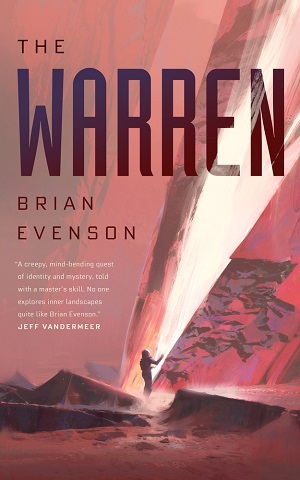 The Warren, by Brian Evenson
The Warren, by Brian Evenson
For a consumer of science fiction, the genre has become an increasingly bloated thing saturated with the grandiose and the absurd. Most movies in the genre are shameless reproductions of better films from several decades ago. Many novels that have large scale exposure in the genre are either bogged down in YA tropes or intended as little more than spec scripts written in prose. This is particularly unfortunate in the case of literature, because well-written text can accomplish things that a monstrous CGI budget can only dream of. In the rush to dazzle and explode, even on the page, so many science fiction works seem to lose sight of how to remain relatable and effective. Enter The Warren, by Brian Evenson. In eighty six pages of masterful writing, The Warren takes us back to the true potential of the genre, simultaneously asking cosmologically existential questions and lacing those questions with fascinating and unnerving intimacy.
The Warren is the story of an individual named X who is living alone in an underground facility, which itself exists in a post-apocalyptic wasteland. He not only faces the prospect of potentially being the last of his kind but also the responsibility of staying alive for the sake of the numerous “personalities” that have been implanted into him. Upon finishing the novella, one of the first things you will be confronted with is the sheer amount of ground covered in spite of the work’s size. Any veteran of the genre will be familiar with the themes present here – isolation, identity, technology, survival, memory and the passage of time, trust, humanity – but that they are all present without getting in each other’s way and while being well and truly addressed, rather than glossed over, is incredibly impressive. The only way this is achievable is through efficient use of language, and Evenson does not disappoint. No time is wasted in the read. The pacing moves quickly and the reader is only presented with exposition in ways that drive the plot forward. If you have read any of my previous reviews, you may have noted that I have a particular fondness for texts that do not hold the reader’s hand as they move, ones that trust their readers to have the wherewithal and experience to make their own conclusions. The Warren is an exemplar of this technique. It drops you right into the thoughts and actions of the “protagonist” and allows you to pick up the nature of the situation and environment through context and subtle presentation. In a sense, this is mandated by the audacity of trying to cover such a weighty story in so few pages. But the novella never disappoints.
What was true and what was rumor, it was difficult to say: it is impossible for me to be objective about the opinions of all the selves contained within me, for I hear not only their words but feel along with them the weight of their conviction.
This kind of delivery lends itself beautiful to one of the most important parts of this kind of fiction – generating atmosphere. Both the reader and the protagonist are dropped into a world that feels familiar enough to make some sense but strange enough that neither are sure anything or anyone can be trusted. Senses are constantly on edge, sometimes through fear but just as often through the triggering of an insatiable hunger for more information. Very little in the text behaves the way you would expect it to, not out of a need to be contrarian but rather because we have been trained to treat the symbolism and tropes of the genre as mandatory and predictable. The combination of these effects lead to a text that can be read quickly or slowly without sacrificing any energy, and which can be read over and over again through different lenses. Is X suffering from dissociative identity disorder or is he really a vessel for different consciousnesses? Is there ultimately a difference? People in our world are beginning to realize the significance of allowing people to define their own identities, so does X have any say in what is or isn’t human? Is the story X constructs to make sense of his reality any less valid than our own?
There are times when I look back at this writing and do not recognize what I have written. There are moments, whole pages even, that are written in my hand, to be sure, but that I have no memory of writing. When I awake, I sometimes find myself deep in the warren before the writing desk, with the charcoal grasped tight in my hand and no memory of how I arrived there.
My favorite thing about The Warren is also something that I did not pick up on until reading through a second time: the novella, among many other things, is a meta-commentary on story-telling. To be fair, in our post-post-modern world, this is an increasingly common thing. But Everson tries his hand at it in a way that blends seamlessly into the story being told and the atmosphere being created. X is, in a way, a carrier of stories, one of the last ones. So much of the human response to mortality and the vastness of the cosmos comes in the form of stories and our hope that said stories will survive beyond us, as if those stories are a form in which we can continue to exist. One of science fiction’s strengths is its ability to show us of the scale of things. Ingenuity, hope, and terror are all equally valid responses to that scale, and they are not mutually exclusive. The Warren raises the stakes and reminds us that when we look out into the void or into ourselves, what we find is not beholden to our expectations.
The Warren is available now through Tor.com
